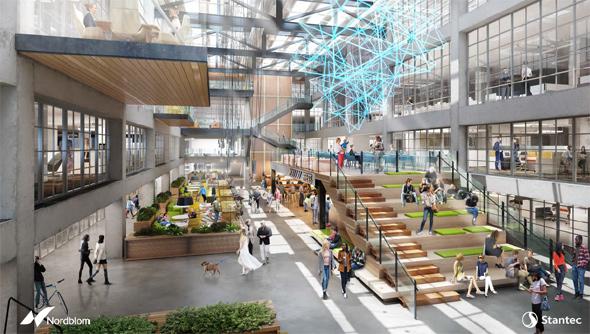August 1, 2018

Architect's rendering of new interior.
The Zoning Board of Appeal on Tuesday approved most of what developers asked for so they can turn the old Boston Globe plant on Morrissey Boulevard in Dorchester into a new office, research and manufacturing space aimed at high-tech companies.
The approval, though, came only after board members struggled with how to define the future: Nordblom Co. had asked for permission for a swath of uses, some of which it might not need, because high tech and the Boston zoning code don't necessarily match up: A private company seeking R&D space needs a different approval than a college seeking R&D space, except for UMass Boston, which is exempt from Boston zoning because it's a state institution, except UMass Boston has so far expressed no interest whatsoever in space in the new building right near its campus. And how does one even define an autonomous-car company under city zoning?
Both the board and the company agreed, however, to strike proposed permission for a tattoo parlor - which the company said it probably wouldn't seek to attract and which the neighborhood said it didn't want because it wouldn't generate too many jobs.
Nordblom Senior Vice President Todd Fremont-Smith told the board that while the nearly 700,000-square-foot building on the 16.5-acre parcel - to be rechristened the BEAT - would cater mainly to space-hungry local startups, the first floor would also be open to the public - including a proposed food hall that would go into the space where giant printing presses once churned out the days news on paper.
Further reading: A farewell to the Globe's Morrissey fortress
He explained what the company is trying to do with the building, for which it paid John Henry $81 million: "Kendall Square is out of space, Boston is running out of space. Everything that's coming out of Kendall Square, out of Boston in the last 30 years is now coming to market," from artificial intelligence and 3D printing to self-driving cars and life science. The Globe plant, with ready access to the JFK/UMass and Savin Hill stops on the Red Line is just the place for the next generation of knowledge workers, he said.
When the building is fully rented, Nordblom expects to see between 2,000 and 3,000 workers - although the building will have a maximum capacity - which would include the food hall and associated uses - of closer to 8,000.
Fremont-Smith added Nordblom has agreed to provide 2,500 square feet of built-out space for training for local students - he said both Boston College High School and the Boston Collegiate Charter School are interested in internship programs.
Zoning-board members, including Dorchester resident Craig Galvin, said they loved the overall proposal. "This is exactly what this space needs," Galvin said.
But they said they were concerned by all the possible uses Nordblom requested, which included: Office, agency or professional office, research or development, product development or prototype manufacturing, laboratory, light manufacturing, restaurant, bar, bar with live entertainment, bakery, general retail business, local retail business, bank, automatic teller machine, fitness center or gymnasium, day care center, art gallery, art use, public assembly, conference center, arts studios, production studios, professional school, college or university, trade school, adult education center, community center, caterer's establishment, body art establishment, carpenters shop, machine shop, photographer’s studio, parking lot, wholesale business.
Nordblom said they came up with that list at the request of ISD Commissioner William Christopher, who said that would cover everything they might need for both the office/R&D space and the food hall and other public space.
Fremont-Smith said knowing they already had city approval for a wide range of uses would make it far easier for him to convince prospective tenants to move in than if he had to apply for zoning approval for them. He added that as part of its own approval in April, the BPDA required creation of a punch list of specific uses that were not allowed - for example, Nordbloom agreed, at the community's request, to not even think of allowing somebody to put in something like BU's biolab, where researchers study highly dangerous pathogens.
"My job is to lure these companies to Dorchester," he said. "The last thing I need is a zoning question."
Galvin, board Chairwoman Christine Araujo and others agreed in general, but said they were worried about just allowing an open-end approval for everything. "Today you're in good standing with the neighborhood," Galvin said. "Tomorrow something changes and you might not be."
Fremont-Smith readily agreed to drop approval for a tattoo parlor.
Board members said they were not opposed to all the other possible uses, but said they want to at least review them first, and so voted unanimously to allow all the possible office and R&D permutations - as well as such things as the uses that would allow a food hall and microbewery, but to require Nordblom to come back if it wants to rent any space for a conference center or to a college or trade school.
The mayor's office, city councillors Frank Baker, Michael Flaherty, and Annissa Essaibi George all supported the proposal, as did the Columbia-Savin Hill Civic Association. Nobody spoke against it.
135 Morrissey Blvd. project-notification form (25M PDF).
This article was also published by Universal Hub on Wednesday. The Reporter and Universal Hub have a longstanding agreement to share resources and stories related to Dorchester.



